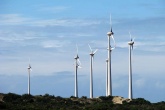Scottish and Welsh ministers warn DECC over renewables strategy
Welsh Natural Resources Minister Carl Sargeant and Scottish Energy Minister Fergus Ewing have written a joint letter to UK Energy Secretary Amber Rudd warning that her renewables strategy ‘will significantly damage’ the renewables sector.

The letter, which was sent yesterday (11 August), follows on from the UK Government’s decision to close the Renewables Obligation early, which has reportedly left many green energy projects, both private and community owned, ‘unclear on what impact this will have for their developments’.
As such, the two ministers wrote to the newly-appointed Energy Secretary yesterday to urge her to ‘establish a meaningful dialogue about potential mechanisms for continuing to support the development of community capacity, community benefit, and the supply chain capacity’.
‘Little economic difference in continuing support and reducing it’
Sargeant and Ewing wrote: ‘This joint letter is a demonstration of our strength of feeling, and looks to set out specific areas for meaningful dialogue following recent announcements about support for renewable energy… Community energy is a key priority for both our governments and we feel very strongly that those communities who have invested heavily, in time, money and commitment, in a cleaner energy future, are deserving of this consideration.
‘You have clearly set out the implications of continued spending at the current rate of deployment, and we are mindful of the costs of commercial development that does not recognise the true, and generally reducing, cost of development. However, we consider that the lack of discussion and advance notice will have an impact that is far more disruptive than was necessary.’
The letter goes to on to note that DECC's assessment on the Renewables Obligation's impact ‘clearly set out that there was little economic difference between the case for continuing the current level of support, and that for the proposed course’, and that Wales’ legal commitments under its new Wellbeing of Future Generations (Wales) Act mean that it ‘would not support a decision based on such short termism’.
They add: ‘Given that it is likely to leave future administrations, to fund the long term costs, and these economic and climate impacts lie within our devolved remits, we are very concerned about the lack of involvement in this decision.’
The letter concludes: ‘We both see that the future direction for energy is one of local generation and supply, based on renewable sources, and smart storage and local grid management, with significant local benefit. The current proposals will significantly damage the prospects for this future if the local ownership and benefits of projects are not considered within the support regime.
‘We very much hope that this letter will establish a meaningful dialogue about potential mechanisms for continuing to support the development of community capacity, community benefit, and the supply chain capacity, in order to deliver on this future.’
Scottish and Welsh projects could be affected
Speaking after the release of the letter, Ewing highlighted that the Isle of Lewis hosts the ‘largest community-owned wind farm in the UK’ (producing nine megawatts of energy), which generates around £1 million a year for the local community. He added that similar projects looking to also benefit both economically and environmentally ‘could be under threat as a result of the recent announcements by the UK government, and it will be tragic if these opportunities are lost to future communities’.
He said: “Local ownership gives communities more control over their own energy and will help us tackle challenges like grid constraints and fuel poverty – while at the same time sparking economic revival.
“There are many communities who have invested significant amounts of money in renewables schemes and have now found the goal posts have been moved, putting crucial investment and jobs at risk.
“We will continue to discuss with the UK Government ways that community schemes with shared ownership can be encouraged under all support schemes and in the meantime, the Scottish Government will continue to support community energy schemes using the powers available to us.”
Similarly, Sargeant was visiting the Anafon Hydro Scheme – a £1.25-million community hydroelectric generating plant that, from December, will generate enough power to supply 200 homes – in Abergwyngregyn yesterday when he said that moves like changing the process for application to Feed-in Tariffs (FiTs) could undermine investor confidence in future community renewable energy schemes.
FiTs are payments made to anyone who owns a renewable electricity system, for every kilowatt hour (kWhr) they generate. The rate varies depending on the type and size of the system used to generate the electricity, with a current maximum of 17.17p/kWhr.
But, the DECC has launched a consultation proposing to remove pre-accreditation and pre-registration from the FiT scheme. This would remove the link to the tariff guarantee for installations that are currently able to be pre-accredited, meaning they would only receive the tariff rate once they have applied for full accreditation.
Because of this developers would not be certain of the level of support they would receive from the scheme until their application of accreditation has been received by Ofgem, after they have begun developing their project.
Sargeant said: “The Abergwyngregyn scheme was able to be built because it was based on sound finance and investor confidence. The alarming proposals by DECC will make it harder for companies to attract investment into low carbon, renewable technologies... [and] make it much harder for communities to benefit from local renewable energy opportunities in the future.”
Action against renewable subsidies ‘protecting consumers’
Since coming into power in May, the Conservative government has announced a number of cuts to renewable energy subsidies.
Alongside launching the consultation on changes to the FiT scheme, the DECC announced the removal of guaranteed level of subsidy for biomass conversions and co-firing projects for the duration of the Renewable Obligation, which aims to help the UK meet European targets for the UK to produce 15 per cent of its energy from renewable sources by 2020.
The department also launched a consultation that would see subsidies closed for solar photovoltaics (PV) projects running at 5 megawatts (MW) and below.
In June it announced that it intends to end public subsidies for new onshore wind generating stations from 1 April 2016, as there are now ‘enough subsidised projects in the pipeline to meet [the UK’s] renewable energy commitments’. While the Climate Change Levy exemption for renewable electricity sources was removed as part of the Summer Budget.
Following the launch of the latest consultations, Energy and Climate Change Secretary Amber Rudd said: “My priorities are clear. We need to keep bills as low as possible for hardworking families and businesses while reducing our emissions in the most cost-effective way.
“Our support has driven down the cost of renewable energy significantly. As costs continue to fall it becomes easier for parts of the renewables industry to survive without subsidies. We’re taking action to protect consumers, whilst protecting existing investment”.
Read the DECC’s ‘Consultation on changes to Feed-in Tariff accreditation’.









